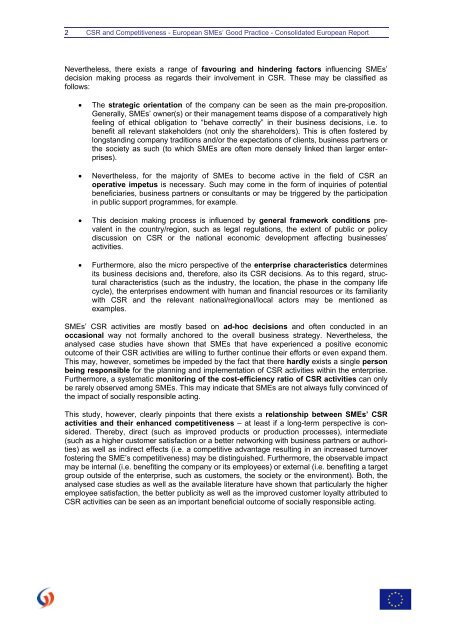CSR and Competitiveness European SMEs - KMU Forschung Austria
CSR and Competitiveness European SMEs - KMU Forschung Austria
CSR and Competitiveness European SMEs - KMU Forschung Austria
Create successful ePaper yourself
Turn your PDF publications into a flip-book with our unique Google optimized e-Paper software.
2 <strong>CSR</strong> <strong>and</strong> <strong>Competitiveness</strong> - <strong>European</strong> <strong>SMEs</strong>’ Good Practice - Consolidated <strong>European</strong> Report<br />
Nevertheless, there exists a range of favouring <strong>and</strong> hindering factors influencing <strong>SMEs</strong>’<br />
decision making process as regards their involvement in <strong>CSR</strong>. These may be classified as<br />
follows:<br />
• The strategic orientation of the company can be seen as the main pre-proposition.<br />
Generally, <strong>SMEs</strong>’ owner(s) or their management teams dispose of a comparatively high<br />
feeling of ethical obligation to “behave correctly” in their business decisions, i.e. to<br />
benefit all relevant stakeholders (not only the shareholders). This is often fostered by<br />
longst<strong>and</strong>ing company traditions <strong>and</strong>/or the expectations of clients, business partners or<br />
the society as such (to which <strong>SMEs</strong> are often more densely linked than larger enterprises).<br />
• Nevertheless, for the majority of <strong>SMEs</strong> to become active in the field of <strong>CSR</strong> an<br />
operative impetus is necessary. Such may come in the form of inquiries of potential<br />
beneficiaries, business partners or consultants or may be triggered by the participation<br />
in public support programmes, for example.<br />
• This decision making process is influenced by general framework conditions prevalent<br />
in the country/region, such as legal regulations, the extent of public or policy<br />
discussion on <strong>CSR</strong> or the national economic development affecting businesses’<br />
activities.<br />
• Furthermore, also the micro perspective of the enterprise characteristics determines<br />
its business decisions <strong>and</strong>, therefore, also its <strong>CSR</strong> decisions. As to this regard, structural<br />
characteristics (such as the industry, the location, the phase in the company life<br />
cycle), the enterprises endowment with human <strong>and</strong> financial resources or its familiarity<br />
with <strong>CSR</strong> <strong>and</strong> the relevant national/regional/local actors may be mentioned as<br />
examples.<br />
<strong>SMEs</strong>’ <strong>CSR</strong> activities are mostly based on ad-hoc decisions <strong>and</strong> often conducted in an<br />
occasional way not formally anchored to the overall business strategy. Nevertheless, the<br />
analysed case studies have shown that <strong>SMEs</strong> that have experienced a positive economic<br />
outcome of their <strong>CSR</strong> activities are willing to further continue their efforts or even exp<strong>and</strong> them.<br />
This may, however, sometimes be impeded by the fact that there hardly exists a single person<br />
being responsible for the planning <strong>and</strong> implementation of <strong>CSR</strong> activities within the enterprise.<br />
Furthermore, a systematic monitoring of the cost-efficiency ratio of <strong>CSR</strong> activities can only<br />
be rarely observed among <strong>SMEs</strong>. This may indicate that <strong>SMEs</strong> are not always fully convinced of<br />
the impact of socially responsible acting.<br />
This study, however, clearly pinpoints that there exists a relationship between <strong>SMEs</strong>’ <strong>CSR</strong><br />
activities <strong>and</strong> their enhanced competitiveness – at least if a long-term perspective is considered.<br />
Thereby, direct (such as improved products or production processes), intermediate<br />
(such as a higher customer satisfaction or a better networking with business partners or authorities)<br />
as well as indirect effects (i.e. a competitive advantage resulting in an increased turnover<br />
fostering the SME’s competitiveness) may be distinguished. Furthermore, the observable impact<br />
may be internal (i.e. benefiting the company or its employees) or external (i.e. benefiting a target<br />
group outside of the enterprise, such as customers, the society or the environment). Both, the<br />
analysed case studies as well as the available literature have shown that particularly the higher<br />
employee satisfaction, the better publicity as well as the improved customer loyalty attributed to<br />
<strong>CSR</strong> activities can be seen as an important beneficial outcome of socially responsible acting.




